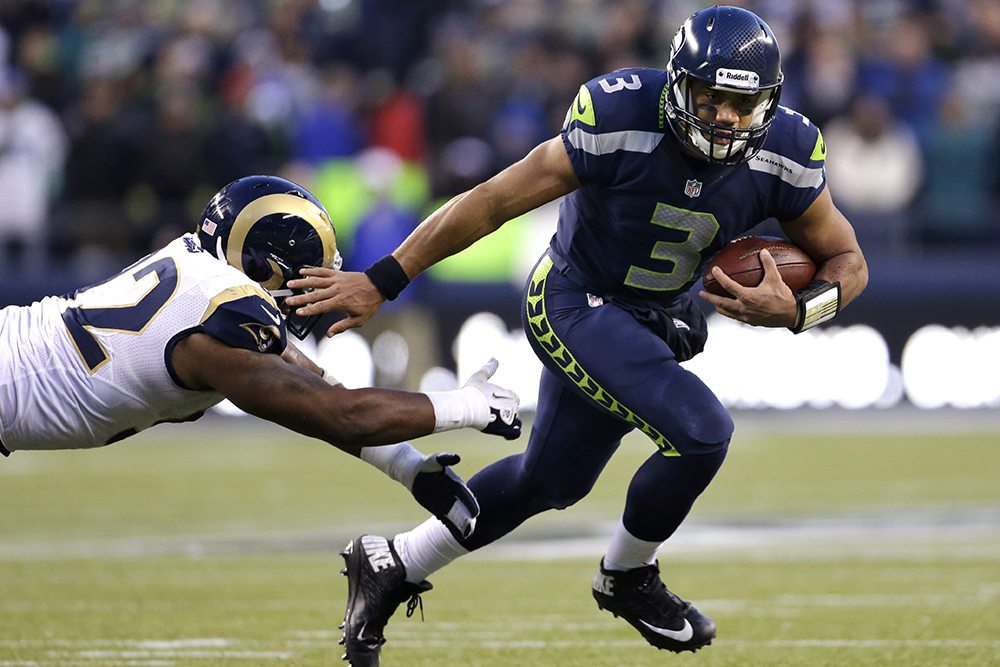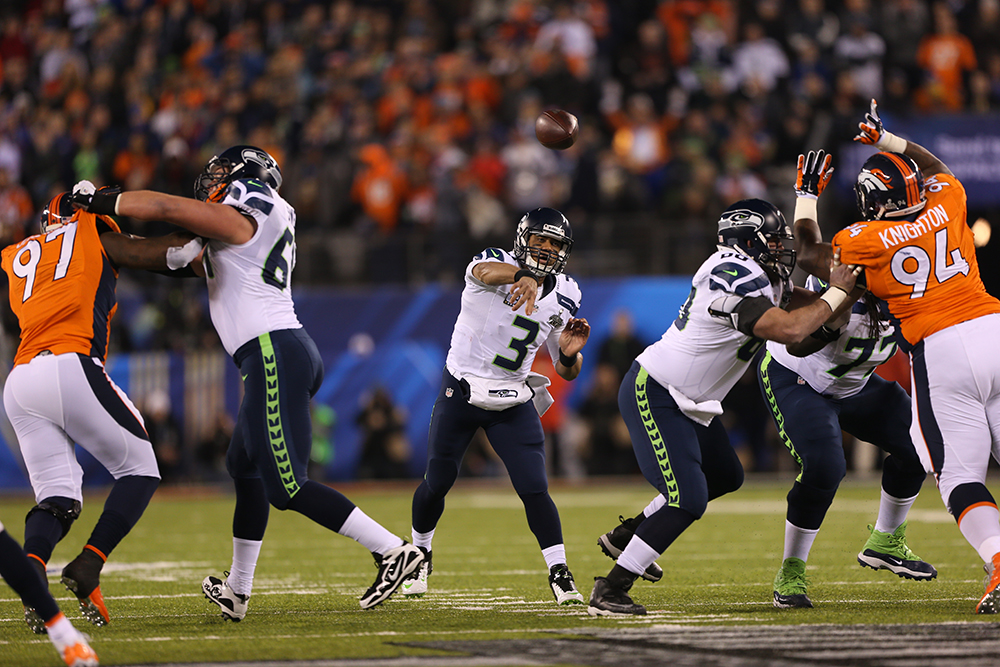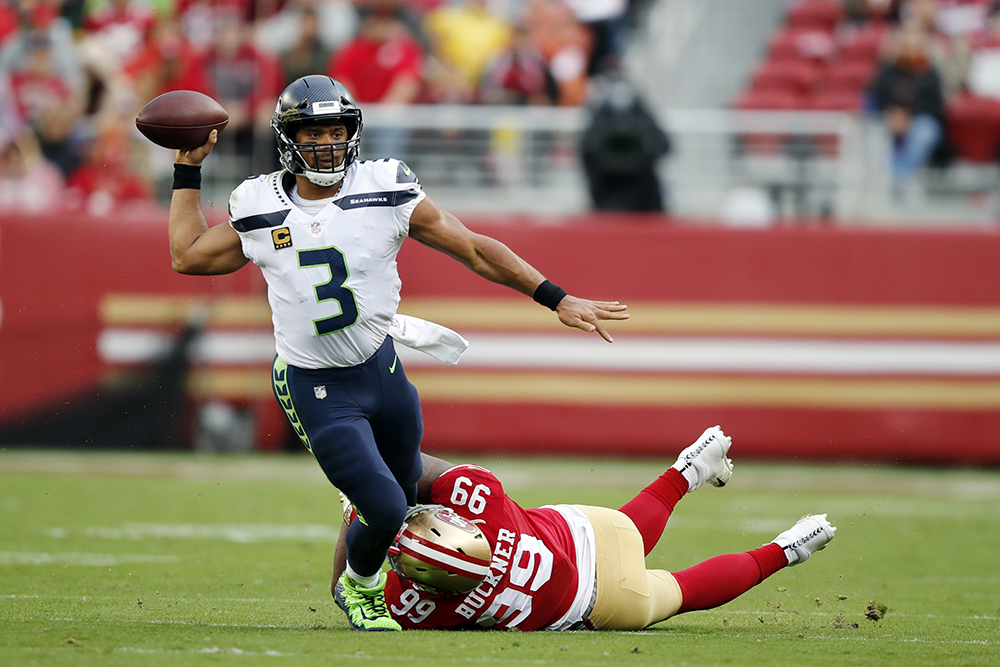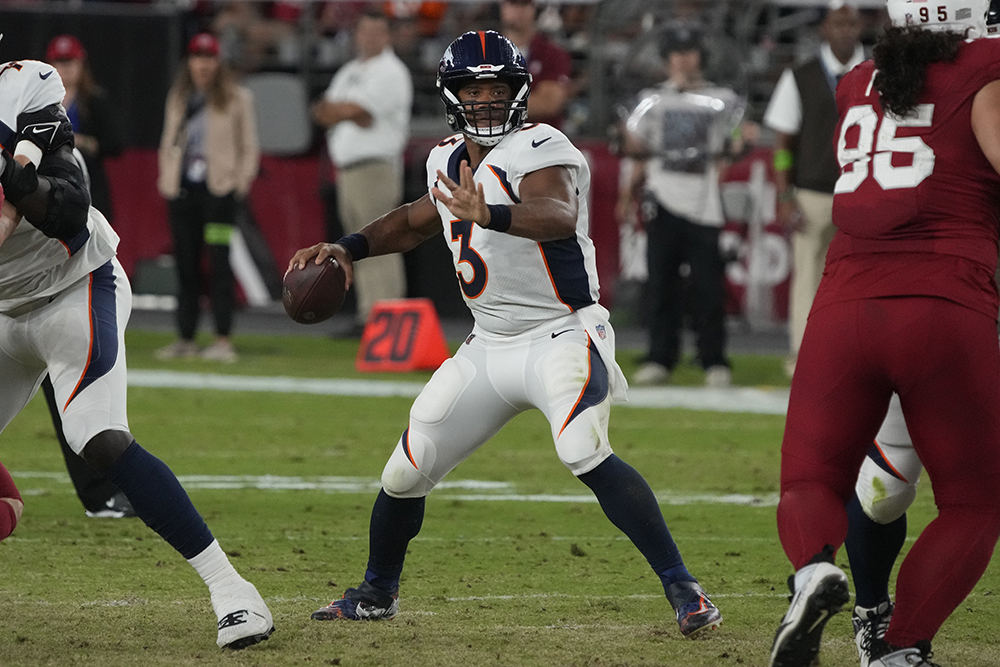Russell Wilson’s decade of dominance in Seattle remains elite
Special to the Pro Football Hall of Fame
(Editor’s note: This article is the latest in an ongoing series looking at quarterbacks’ achievements that have aged well over the past 80 NFL seasons.)
When the Denver Broncos traded for Russell Wilson prior to the 2022 season, the team landed a quarterback coming off a 10-year statistical rampage few others have rivaled.
His debut season in Denver? The roughest of his 11-year career. Despite his performance taking a big step forward over his final seven games, the Broncos lost six times before defeating the Los Angeles Chargers 31-28 in the regular-season finale.
With Week 1 of the 2023 season quickly approaching, Broncos fans can only wait to see which version of Wilson they will be getting: the one from early 2022 or the one who delivered a decade of dominance in Seattle.
For now, let’s wind back the clocks and take a walk through Wilson’s football journey.
Eleven seasons in, his résumé stands tall as one of the most impressive, not just of his generation, but in all of pro football history.
His legacy, which remains a work in progress, is also one of the more complicated.
Peers of his generation have included PEYTON MANNING, Drew Brees, Tom Brady, Aaron Rodgers and Patrick Mahomes.
At one point or another, Wilson has picked up big wins against each of them.
At one point or another, Wilson also has produced seasons where his total level of performance topped theirs.
A strong pedigree

Wilson’s father, Harrison Wilson III, was a duel-sport athlete and wide receiver at Dartmouth. He spent time with the San Diego Chargers in 1980, making the preseason roster and catching a touchdown pass against the San Francisco 49ers.
As a high school quarterback, Russell Wilson won three state championships and was featured in the Faces in the Crowd section of Sports Illustrated following his performance in the Nov. 18, 2006, title game. He attended the Manning Passing Academy and years later was recognized by Peyton Manning during a pre-draft visit with the Denver Broncos.
In college, Wilson became a prolific duel-threat quarterback at North Carolina State (2008-2010) and Wisconsin (2011). In four years of NCAA action, he threw 109 touchdown passes and only 30 interceptions.
In 2011, Wilson’s 33 touchdown passes set a Wisconsin school record and put him second in Big Ten history behind only Drew Brees’ 39 in 1998 at Purdue. His 191.8 passing efficiency rating was, at the time, the highest single-season mark in FBS history.
That kind of high school and college résumé would leave many in contention as the No. 1 overall pick in the next NFL Draft.
Unfortunately for Wilson, he stood 5-feet-11, and 2012 also happened to be the year the prototype quarterback – 6-foot-4 Andrew Luck of Stanford – declared himself eligible.
And it wasn’t only Luck who came between Wilson and the top of teams’ draft boards.
Five quarterbacks were taken before Wilson was selected 75th overall by the Seattle Seahawks: Luck first, Robert Griffin III second, Ryan Tannehill eighth, Brandon Weeden 22nd and Brock Osweiler 57th.
Eventually, Wilson would surpass all of them.
His 26 touchdown passes in the 2012 season tied the NFL rookie record Peyton Manning had set in 1998. His 74.8 Total QBR ranked No. 1 in the NFC and third in the NFL, behind only Manning (78.9) and Tom Brady (77.2).
On Oct. 14, 2012, Wilson’s 293-yard, three-touchdown, zero-interception, 133.7 passer rating performance helped lead the Seahawks to a 24-23 win over Brady and the New England Patriots.
In 2013, Wilson’s Seahawks finished 16-3 (including the postseason). His 18-of-25 (72.0%), two-touchdown, zero-interception, zero-sack, 123.1 passer rating performance in Super Bowl XLVIII helped defeat league MVP Manning and the Broncos.
There is no question the “Legion of Boom” delivered a historically dominant performance, but Wilson’s flawless execution on offense contributed as much to the 43-8 win as any other individual contribution.
In 2014, Wilson’s 35-yard game-winning touchdown pass in overtime of the NFC Championship Game gave the Seahawks a 28-22 win over league MVP Aaron Rodgers and the Green Bay Packers.
Everyone knows what happened next.
Malcolm Butler’s goal-line interception of a Wilson pass with 0:24 left in the fourth quarter of Super Bowl XLIX might go down as the most memorable moment of Wilson’s storied career, but that framing misses the mark more than his pass did.
Wilson’s 92.9 Total QBR that night accounts for the totality of his performance, interception included. It bested Brady’s impressive 87.5 by some distance and stood as the highest single-game postseason mark by any qualifying quarterback in the 2014 playoffs and topped every Super Bowl-winning performance until last season.
Super Bowl QBR

Total QBR in Super Bowls since it became a stat in 2006:
- 96.0: Patrick Mahomes (LVII vs. Eagles)
- 92.9: Russell Wilson (XLIX vs. Patriots)
- 90.2: Joe Flacco (XLVII vs. 49ers)
- 87.8: Russell Wilson (XLVIII vs. Broncos)
- 87.5: Tom Brady (XLIX vs. Seahawks)
- 87.1: Nick Foles (LII vs. Patriots)
- 86.2: Drew Brees (XLIV vs. Colts)
- 83.0: Aaron Rodgers (XLV vs. Steelers)
- 76.7: Tom Brady (LV vs. Chiefs)
- 75.8: Tom Brady (LI vs. Falcons)
- 74.3: Eli Manning (XLII vs. Patriots)
- 73.1: Eli Manning (XLVI vs. Patriots)
- 69.0: Peyton Manning (XLI vs. Bears)
- 66.4: Matthew Stafford (XVI vs. Bengals)
- 63.5: Patrick Mahomes (XIV vs. 49ers)
- 47.7: Ben Roethlisberger (XLIII vs. Cardinals)
- 24.4: Tom Brady (XLIII vs. Rams)
In 2016, Wilson produced 4,478 total yards of offense, finished sixth in the NFL in yards per attempt (7.7), led four fourth-quarter comebacks, finished with a 10-5-1 regular-season record and picked up a 26-6 win over the Detroit Lions in the postseason.
On Nov. 13, 2016, Wilson’s 348-yard, three-touchdown, zero-interception, 124.6 passer rating performance helped the Seahawks to a 31-24 win over the Patriots. Including the postseason, Brady recorded a 14-1 record as a starter in 2016, ending the season with a 25-point comeback win over the Atlanta Falcons in Super Bowl LI.
Brady’s lone loss that season came after being outdueled by Wilson on “Sunday Night Football.”
DAN MARINO'S prime-time win against the 1985 Chicago Bears (18-0 that season in non-Marino games) receives praise, as it should.
So, too, should Wilson’s win over Brady’s Patriots, coached by Bill Belichick and backed by the NFL’s No. 1 scoring defense (a combination that finished 14-0 in non-Wilson games).
And that was a down year by Wilson’s standards.
At his best in 2017?
During his decade in Seattle, it could be argued that 2017 was Wilson's finest season.He led the NFL in both touchdown passes (34) and total touchdowns (37) despite being backed by a ground game that produced one rushing touchdown from a running back all season.
In fact, Wilson led the Seahawks in rushing yards (586), yards per cary (6.2) and rushing touchdowns (three).

Excluding his production, the Seahawks averaged 3.3 YPC – a figure that would have ranked 32nd in the NFL. Outside of Wilson, the team’s leading rusher was Mike Davis, who produced 240 yards on the ground.
To make matters worse, Seattle’s offensive line finished the season 26th in adjusted sack-rate (per Football Outsiders).
Despite these challenges, Wilson led the NFL in fourth-quarter passer rating (134.1) and percentage of offense accounted for (4,569 of 5,608 yards – 81.5%).
His 19 fourth-quarter touchdown passes remain an NFL record that has been unthreatened through 2022, despite expansion to a 17-game regular season.
Like the season before, Wilson’s defining moment again came on “Sunday Night Football”: 20-of-31 for 227 yards with three touchdowns, zero interceptions and a 118.6 passer rating to defeat the eventual Super Bowl champion Philadelphia Eagles 24-10.
His passing performance was so strong it pushed the Eagles’ surrendered passer rating for the season from 75.5 to 79.5, knocking them from fourth to ninth in the league. His 118.6 passer rating was 43.1 points higher than what the Eagles allowed collectively in all non-Wilson games.
In other words: dangeruss
Wilson showed no signs of slowing down in 2018. He finished the season ranked third in the NFL in passer rating at 110.9 (below only Brees at 115.7 and Mahomes at 113.8). He led the NFC with 35 touchdown passes (tied with Matt Ryan).
His 8.2% touchdown pass percentage made history as the highest mark for a player who wasn’t named MVP (minimum 400 attempts) at season’s end.
The elite list above him includes three Hall of Famers (Manning, Marino and KURT WARNER) and three other quarterbacks expected to be enshrined (Rodgers, Brady and Mahomes):
- Peyton Manning (2004): 9.9%
- Aaron Rodgers (2020): 9.1%
- Aaron Rodgers (2011): 9.0%
- Tom Brady (2007): 8.7%
- Patrick Mahomes (2018): 8.6%
- Dan Marino (1984): 8.5%
- Peyton Manning (2013): 8.3%
- Kurt Warner (1999): 8.2%
- Russell Wilson (2018): 8.2%
In 2019, Wilson was named first-team All-Pro by Pro Football Focus and second-team All-Pro by the Associated Press. He shared the NFC lead with 34 total touchdowns, but unlike co-leader Jameis Winston, who led the NFL with 30 interceptions, Wilson threw only five picks all season.
He led the NFL in fourth-quarter comebacks (four) and game-winning drives (five).
If you include his postseason production (passing + rushing), his numbers were nearly identical to league MVP Lamar Jackson and Super Bowl LIV MVP Patrick Mahomes. The difference: Wilson wasn’t doing it behind an elite offensive line or in Andy Reid’s offense throwing to Tyreek Hill and Travis Kelce. He was doing it in Seattle behind one of the lowest-rated offensive lines in football that season.
Russell Wilson (2019, including postseason)
- 106.4 passer rating
- 668 total attempts (passing + rushing)
- 5,163 total yards
- 7.7 total yards/attempt
- +29 (total touchdowns vs. turnovers)
- 27th-ranked offensive line (PFF)
- 106.9 passer rating
- 656 total attempts
- 4,841 total yards
- 7.4 total yards/attempt
- +33 (total touchdowns vs. turnovers)
- Second-ranked offensive line (PFF)
- 106.5 passer rating
- 663 total attempts
- 5,285 total yards
- 8.0 total yards/attempt
- +31 (total touchdowns vs. turnovers)
- 16th-ranked offensive line (PFF)
More of the same in 2020

Closely matching and at some points exceeding his MVP/future Hall of Famer peers with less support has been a storyline across Wilson’s career.
The 2020 season brought more of the same.
Wilson began the season hot, throwing 14 touchdown passes in his first three games to break the NFL record Mahomes set in 2018 (13).
By the end of the season, Wilson had thrown a career-high 40 touchdowns passes. He and Brady finished tied for second in the NFL with Brady throwing 52 more passes (610 to 558).
Wilson suffered a broken finger against the Los Angeles Rams on Oct. 7, 2021, ending his consecutive start streak at 165. Including the postseason, it was the sixth longest streak at quarterback in NFL history:
- Brett Favre: 321 (9/27/92-12/5/10)
- Philip Rivers: 252 (9/11/06-1/3/21)
- Peyton Manning: 227 (9/6/98-1/2/11)
- Eli Manning: 222 (11/21/04-11/23/17)
- Russell Wilson: 165 (9/9/12-10/7/21)
Despite the injury, Wilson returned and closed out the season ranked fourth in passer rating (103.1), fifth in yards per attempt (7.8), fourth in touchdown pass percentage (6.3%), fourth in interception percentage (1.4%) and third in adjusted yards per attempt (8.4).
His decade of dominance in Seattle included nine Pro Bowl selections, two conference championships, a Super Bowl ring and a lengthy list of elite statistical finishes and NFL records.
Through 11 NFL seasons (10 in Seattle, one in Denver), Wilson has produced eight seasons with 10 or more wins. Including the postseason, he has accounted for 49,883 total yards of offense, 363 touchdowns, 31 fourth-quarter comebacks, 39 game-winning drives and 117 wins.
What’s to come in 2023?
Stay tuned.
Ryan Michael is statistician, sportswriter and contributor to the Pro Football Hall of Fame. You can follow him on Twitter: @theryanmichael .
This article is the latest in an ongoing series highlighting noteworthy quarterback play over the past 80 seasons. Information from Pro-Football-Reference.com’s database, including its “Player Tools,” helped make the research possible. Total QBR via ESPN. Offensive line rankings via Pro Football Focus and Football Outsiders.
More of this series
- Analysis: Charlie Conerly’s giant accomplishments hold up as eras pass
- Y.A. Tittle’s journey from San Francisco to New York
- Analysis: An appreciation of Sammy Baugh’s historic 1943 season
- Legendary seasons for Sid Luckman, Peyton Manning separated by 70 years
- Looking back at TB12’s historic 2011 season 12 years later
- Russell Wilson’s decade of dominance in Seattle remains elite
- Roger Staubach’s 1971: The greatest season you’ve never heard about
- Silver anniversary: Randall Cunningham’s solid gold season with Vikings
- 50 years since Unitas’ last pass: Some things you might not know about No. 19
- Race to the top: Brady’s battle with Brees for the NFL’s most hallowed record
- Analysis: Did Andrew Luck exceed hype or fall short?
- Silver anniversary of John’s Elway’s sterling final game
- As cold as ice: Perception of Matt Ryan’s legacy after ‘28-3’
- Cam Newton leads high-flying 2015 Carolina Panthers
Pro Football Hall of Fame serving up Ribs Burnoff revival
The Pro Football Hall of Fame is bringing back a local favorite as a "kickoff to summer 2024." Debuting next spring, the Hall of Fame Ribs Burnoff will be held May 23-25 (Thursday through Saturday of Memorial Day weekend).
Gold Jacket Spotlight: Morten Andersen gave more than he took
The name Morten Andersen, which this week takes its place in the Gold Jacket Spotlight, represents far more than someone who set the NFL record for points.

